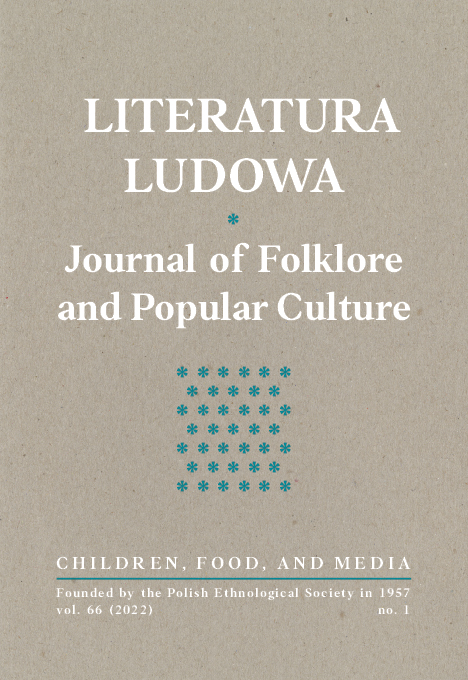Gumbo czy gofry z kurczakiem? Jedzenie jako metafora afroamerykańskiej tożsamości
DOI:
https://doi.org/10.12775/LL.1.2022.003Ключові слова
afroamerykańska literatura dziecięca, książka obrazkowa, kultura jedzenia, relacje tekstu i obrazu, tożsamość afroamerykańskaАнотація
Afroamerykańska literatura dziecięca zawsze miała charakter polityczny. Jej głównym celem jest promowanie pozytywnego wizerunku czarnoskórej społeczności w USA, a także kształtowanie tożsamości rasowej młodych czytelników. Dla wielu czarnoskórych autorów jedzenie stało się metaforą więzi kulturowych i emocjonalnych, będących źródłem optymizmu, dumy z przynależności do rasy czarnych i chęci walki z nierównościami społecznymi. Celem artykułu jest ukazanie funkcji politycznych i społecznych jedzenia w społecznościach afroamerykańskich na przykładzie wybranych książek obrazkowych czarnoskórych twórców, m.in. Nikki Giovanni, Faith Ringgold, Bryan Collier i Oge Mora. Główną część artykułu stanowi analiza relacji między narracją słowną a niezwykle barwnymi ilustracjami znanych amerykańskich artystów ukazujących domowe przestrzenie, w których jedzenie wyraża niepowtarzalność kultury afroamerykańskiej.
Посилання
Anderson, K. (2015). Food Memory: Nikki Giovanni, Edna Lewis, Scott Peacock and the Southern Food Revival. LURe, 5, 43–54.
Andrews, T., Collier, B. (2015). Trombone Shorty. New York: Abrams.
Andrews, T., Collier, B. (2018). The 5 O’Clock Band. New York: Abrams.
Bergstrand, U., Nikolajeva, M. (1999). Läckergommarnas kungarike: Matens funktion i barnlitteraaturen. Stockholm: Centrum för barnkulturforskning vid Stockholms universitet.
Charles, T., Alcantra, J. (2019). Freedom Soup. Somerville: Candlewick Press.
Collier, B. (2000). Uptown. New York: Henry Holt and Company.
Daniel, C. (2006). Voracious Children: Who Eats Whom in Children’s Literature. New York: Routledge.
DeVault, M. (1991). Feeding the Family: The Social Organization of Caring as Gendered Work. Chicago: University of Chicago Press.
Garcia-Williams, R. (2010). One Crazy Summer. New York: Amistad.
Giovanni, N. (1968). Black Feeling, Black Talk. New York: Broadside Press.
Giovanni, N., Johnson, L. (1994). Knoxville, Tennessee. New York: Scholastic.
Hall, R. (2007). Africa and the American South: Culinary Connections. Southern Quarterly, 44(2), 19–52.
Hunter, M. A., Zandria, F. R. (2018). Chocolate Cities: The Black Map of American Life. Oakland: University of California Press.
Keeling, K., Pollard, S. T. (red.) (2009). Critical Approaches to Food in Children’s Literature. New York: Routledge.
Keeling, K., Pollard, S. T. (red.) (2020). Table Lands: Food in Children’s Literature. Jackson: University Press of Mississippi.
Liburd, L. (2003). Food, Identity, and African American Women with Type 2 Diabetes: An Anthropological Perspective. Diabetes Spectrum, 16(3), 160–165.
Miller, A. (2013). Soul Food: The Surprising Story of an American Cuisine, One Plate at a Time. Chapel Hill: The University of North Carolina Press.
Miller, A., Worley, S. (2016, June 29). Where Soul Food Really Comes From [interview on the website Epicurious]. Retrieved from: https://www.epicurious.com/expert-advice/real-history-of-soul-food-article
Mora, O. (2018). Thank You Omu! New York: Little, Brown Books for Young Readers.
Niewiadomska-Flis, U. (2017). Live and Let Di(n)e: Food and Race in the Texts of the American South. Lublin: Wydawnictwo KUL.
Nikolajeva, M., Scott, C. (2006). How Picturebooks Work. New York: Routledge.
Poe, T. (1999). The Origins of Soul Food in Black Urban Identity: Chicago, 1915–1947. American Studies International, 37(1), 4–33.
Ringgold, F. (1991). Tar Beach. New York: Scholastic.
Rokicki, J. (2002). Kolor, pochodzenie, kultura. Kraków: Universitas.
Downloads
Опубліковано
Як цитувати
Номер
Розділ
Ліцензія

Ця робота ліцензується відповідно до Creative Commons Attribution-NoDerivatives 4.0 International License.
1. The authors give the publisher (Polish Ethnological Society) non-exclusive license to use the work in the following fields:a) recording of a Work / subject of a related copyright;
b) reproduction (multiplication) Work / subject of a related copyright in print and digital technique (ebook, audiobook);
c) marketing of units of reproduced Work / subject of a related copyright;
d) introduction of Work / object of related copyright to computer memory;
e) dissemination of the work in an electronic version in the formula of open access under the Creative Commons license (CC BY - ND 3.0).
2. The authors give the publisher the license free of charge.
3. The use of the work by publisher in the above mentioned aspects is not limited in time, quantitatively nor territorially.
Stats
Number of views and downloads: 698
Number of citations: 0



